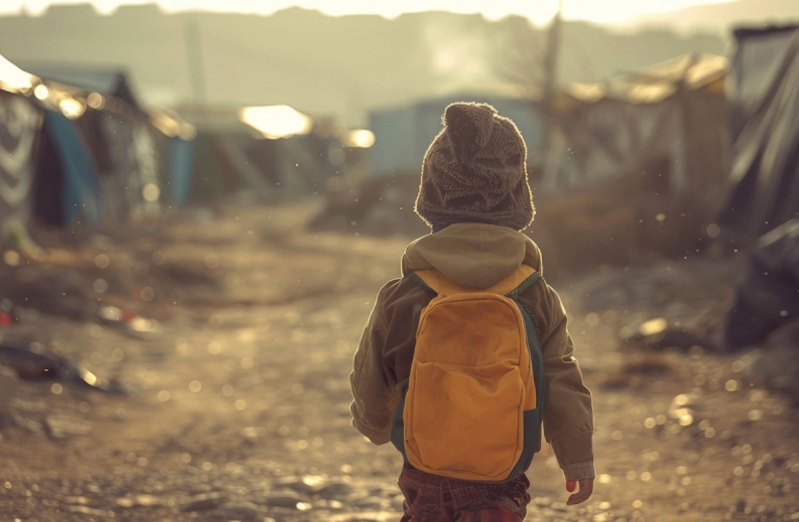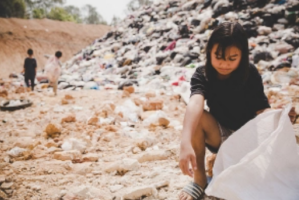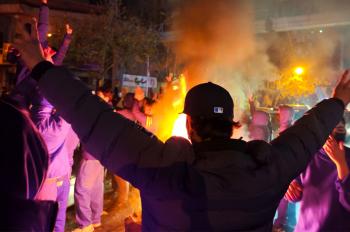
Indigence has quadrupled in the last four years, and poverty now affects 24.9 million Argentines, according to the latest data. The National Institute of Statistics and Census (Indec) revealed this Thursday that more than half of Argentinians are poor. Especially concerning are those under 14 years of age, where two out of three live in poverty and do not receive the four meals necessary for healthy nutrition, according to the first survey conducted since Javier Milei became president.
The study indicated that poverty rose to 52.9% in the first half of the year. Simultaneously, the indigence rate worsened, with 18.1% of the population unable to meet their basic food needs, representing 8.5 million people.
The most alarming figure concerns children under 14, with 66.1% living in households with incomes below the Total Basic Food Basket (canasta básica total, CBT), meaning they do not have enough to meet their most basic needs. Furthermore, 27% of children in this age group are in a state of indigence, meaning that one in four children is going hungry because their households cannot meet basic nutritional needs. Many do not even have one nutritious meal a day.
In response to this dire situation, evangelical churches continue to provide community support through soup kitchens, family assistance, school programs, and psycho-pedagogical accompaniment, offering comprehensive social assistance.
Diario Cristiano, Christian Daily International's Spanish edition, spoke with several ministries across the country that work with Christian and non-Christian families living in desperate poverty. Pastor Marcelo Morales, national director of Cru (formerly known as Campus Crusade for Christ), shared the work this ministry carries out in different parts of the country.
“As a Christian organization, we are deeply concerned about the situation in the country. The figures are alarming. Even more so when you travel around the country and visit places where people lack the basic necessities to live or survive adequately. Many places are unseen due to their remoteness, and their needs—such as access to drinking water, housing, education, and healthcare—are tremendous,” he said.
Cru has committed to helping people meet their most basic needs by providing material and spiritual aid. "In the face of this reality, we are driven to act and be the hand of God that provides assistance," Morales said. "Jesus himself did this. He went through villages, healing the sick, feeding the hungry, and preaching the kingdom of God. What we are doing is not just the social gospel but the full gospel. If someone is hungry or in deep need, if their stomach is empty, they cannot listen well, and the message will be incomplete."
Methodist Pastor Carlos Jacobs, who leads a congregation in southern Greater Buenos Aires, shared a similar sentiment. “Now that there is a greater need for food, people are more focused on eating. As a result, they come with less spiritual restlessness,” he said.
The church Jacobs pastors in Bernal—a town in Buenos Aires Province—has been providing social assistance to local families for several years, even before the pandemic. However, since President Milei took office, the situation has worsened, and some members of the congregation are now lacking basic needs themselves.
“There’s a street market in front of the church—a fruit and vegetable market that gathers on Wednesdays. We went there to hand out pamphlets. But people started asking us for clothes,” Jacobs said. “So we decided to put up a sign that read, 'solidarity rack—bring clothes you no longer wear, and take clothes for free.’ That's how the work began, and it started to bear fruit. The church is located in a middle-class neighborhood, but just ten blocks away is Villa Itatí, which I believe is the largest slum in the southern zone. Across from Villa Itatí is Villa Azul—both areas of extreme poverty.”
In La Matanza, a western district of Greater Buenos Aires, Pentecostal Pastor Sonia Ciulla, her children, and a team of church leaders have been reinforcing connections with neighborhood children and families. “We have continued the work we began during the pandemic—running a small school and providing meals. For the past four years, we’ve been giving food to those in need every Saturday without interruption. We provide meals because it’s practical, especially with COVID concerns. People have continued to come, and the need keeps growing,” she said.
“There are families—not only women and children, but men too—who come seeking food. On Tuesdays, we also offer snacks to the needy in this area,” Ciulla added.

Back in Bernal, Pastor Jacobs shared an uplifting story of solidarity. "One Wednesday, a man who runs a Facebook group called 'Bernal and its History' walked by the church and saw our work. Though he’s not a believer, he told me, ‘When someone’s doing something right, you have to help.’ He posted about our solidarity rack on the group’s page, and since then, people have been coming with donations of clothes. The number of people bringing clothes is impressive.”
He continued, “The neighbors have gotten used to donating clothes, and in return, we give them a devotional booklet as a gesture of gratitude. Some people have asked, ‘Don’t you have a store?’ We didn’t, but we started collecting goods to share. During the previous government, we received monthly social assistance in the form of food donations. That allowed us to offer not only clothes but also essential food items.”
Pastor Jacobs emphasized that the change in government and the restructuring under Milei’s administration has affected the entire country. “Many people have come to us seeking food and clothing. Unfortunately, since December last year, social aid has been cut, and we no longer receive food donations. We’ve had to focus more on the needs within the congregation, as many who were once middle class are now struggling to make ends meet.”
Despite the crisis, the church in Bernal is growing. Through their acts of social service and solidarity, several families have come to faith in Christ and have been baptized.
Pastor Marcelo Morales also spoke about the VAS Foundation (Valores al Servicio), which supports areas of extreme need by addressing basic necessities and sharing biblical values. “We select specific places where we carry out missionary projects throughout the year. We aim to make an impact in these impoverished communities, offering medical assistance, donations, and other resources that are often difficult to obtain,” Morales said.
Cru runs various projects in places like Northwestern Argentina (NOA), southern Mendoza, and several towns in the Misiones Province. "We bring items such as slippers and non-perishable food. We’ve partnered with the Universidad del Litoral, which developed a product called 'superguiso,' a dehydrated meal that provides daily nutrition when rehydrated and heated," explained Morales.
Pastor Sonia Ciulla added that her church has also partnered with Samaritan’s Purse, part of the Billy Graham Evangelistic Association. “We host ‘friends' evenings’ where we gather for informal fellowship—drinking mate, chatting, and praying. Tomorrow, we have an evangelistic event with Samaritan’s Purse, where children will receive gifts and lessons of encouragement. These are the same children who come for lunch or snacks on Saturdays.”
Child poverty rates have soared over the past year, with Indec reporting that 56.2% of children were living in poverty in the first half of 2023, and 13.6% were in indigence.
Despite these grim statistics, the evangelical church remains active in its faith, offering both spiritual and material sustenance. Diario Cristiano shared just three stories, but across the country, there are millions of stories of people who, moved by their love for God, selflessly help those in need.
First published by Diario Cristiano, Christian Daily International's Spanish edition.





